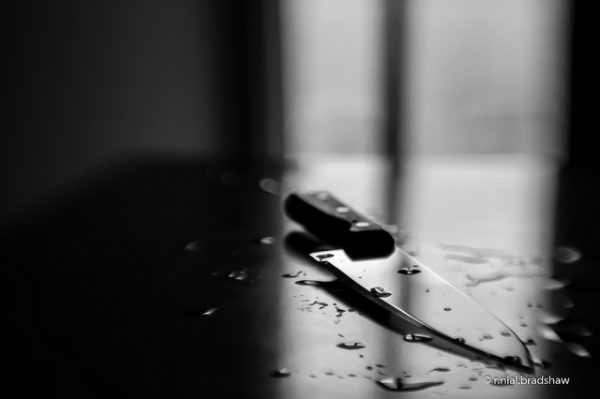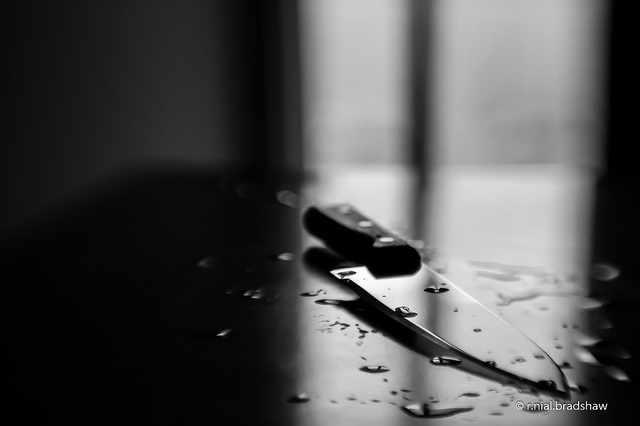Rudy Omisore spoke to a former prisoner and a present-day prison officer about knife crime BEHIND prison bars.

We all know about the increasing use of knives in street crime. According to the Office of National Statistics offences involving knives and sharp instruments rose by two percent in 2015 – even though mere possession of a knife can carry a prison sentence of up to four years. But there is anecdotal evidence to suggest that knife crime is also on the rise in prison
To gain a better understanding of knife crime behind bars, I spoke to a prison officer and an ex-offender.
The Prisoner:
You can’t run, or hide, when you’re doing time. You have to step up and deal with it, or your time in there will be far from nice, put it that way!
In the prison I was in, I saw plenty of knives. All types – some made from toothbrushes and some actually from the kitchen. From long time, knives have been a thing inside; because they are easy to make. It’s crazy, to be honest, but you have to look after yourself at the end of the day. The knives are mainly made for self-protection, which is what most people fail to realise, not to mention that these knives rarely get used. Sometimes, people make them with bad intentions, but they know if they get caught, they will get another sentence on top of the one they’re already inside for.
Believe it or not, inside is a lot worse than out. At least outside you have an open space, where you can disappear if things go wrong. Inside you are trapped, and if you have a disagreement you are forced to deal with it. Also, where everyone has so much time on their hands, the things they conjure up can put anyone in danger. For example, while I was serving my time in prison, there was a stabbing that happened on my wing. It was a group of boys, mixed in ethnicity and there were around five of them… who… had a problem with a newcomer who had just arrived… who had problems with one of their friends on the outside. So being loyal friends, they took it upon themselves to handle it, but little did they know the boy… had already spotted them. Straight away he made a knife in his cell for protection. He could see he was outnumbered from the start and that things could easily get messy. He wasn’t wrong.
A couple weeks went by, and still nothing. Everyone was just keeping themselves to themselves. Then one afternoon at Association, it popped off. This is the one hour of freedom prisoners get a day to… do various activities. The boy was taking a shower when the five boys came in and beat him up, leaving him on the wet shower floor. To be fair, with all those boys and him by himself, he did well to leave there with just a few cuts on his legs and arms and a bump on his head.
The five boys left and went back to the pool room like nothing had happened. The other boy was angry, but he stayed there in the shower and waited for the call to get banged up again. He went to his cell, and within a couple hours everybody was let out again for dinner. That’s when the boy took… revenge, stabbing the first one of the five boys he saw, using the knife that he’d made from a toothbrush. He stabbed the boy in his side, and in his head as well as, cutting his face. Blood was everywhere. Alerted quickly, the guvs ran over to him and pulled him off the boy, pinning him down to the ground. Meanwhile, all the prisoners were going crazy making loads of noise, it’s all going off at this point.
Following procedure, the guvs took the boy down to the block to see the guvnor for his punishment. That’s when the outside police got involved and the boy who got stabbed pressed charges and gained compensation. The knife-boy, who didn’t have long left on his sentence to serve is now serving an extra two years, for something he was forced to do by being trapped, trapped inside a place filled with pent up anger, and ticking time bombs, ready to blow. It’s not right, but do you blame us?!
The Prison Officer:
Recently I escorted a prisoner to his relative’s funeral. The relative was a gang member who’d been murdered. I had to stand there cuffed to the prisoner as they washed the body, which had been chopped up and hacked away at with a machete.
During my time as a prison officer I have gained experience of the weapons in our prisons and how they are made, and why they are used. Most behaviour in prisons is replicated from the streets, where carrying a knife is common among gang members, who mainly carry them to protect themselves. It’s the same in prisons, but a prisoner will feel even more vulnerable inside than on the streets. Rival gangs will be locked up together, and quite often on the same wings. Gang fights are a regular occurrence, where groups of prisoners are constantly competing for the position of “top dog.” Prisoners will also feel it necessary to carry a knife if they feel vulnerable or under threat for other reasons such as bullying or in being in debt to another prisoner.
The majority of weapons found in prisons are improvised. They are handmade, and prisoners will use various materials available to them, and anything unauthorised that they may be able to get their hands on. Prisoners also have a lot of time on their own in cells to make these. Some of the most common are razor blades melted into toothbrush handles or sharpened toothbrushes.
Serious incidents I have witnessed include a prisoner being stabbed in the neck with a sharpened toilet brush – the victim was very lucky to survive. As well as this, I witnessed an officer being stabbed in the stomach with a screw fixed into a deodorant bottle. Thankfully, he was OK.
However, there have definitely been more assaults with the use of sharp weapons in prisons, which coincides with the rise in knife crime on the outside – although a fall in the amount of ‘cell spins’… may have a lot to do with this. Officers now tend to only search an inmate’s cell if they receive intelligence that inmates are up to no good, whereas before, all inmates’ cells were searched every two months. In general, the way in which prisons are run has become much slacker, compared to when I started out as a prison officer.
Comment:
So toothbrushes seem to be a prison favourite, either sharpened, or with razor blades melted into them – and used not only to purposely harm another inmate, but as both interviewees point out, more often for protection. Prisons are clearly failing to make prisoners feel safe. And the prison officer I spoke to does not feel safe, either. But at least he gets to go home at the end of the day, unlike the inmates, who have no choice but to remain in the corridors of fear.

